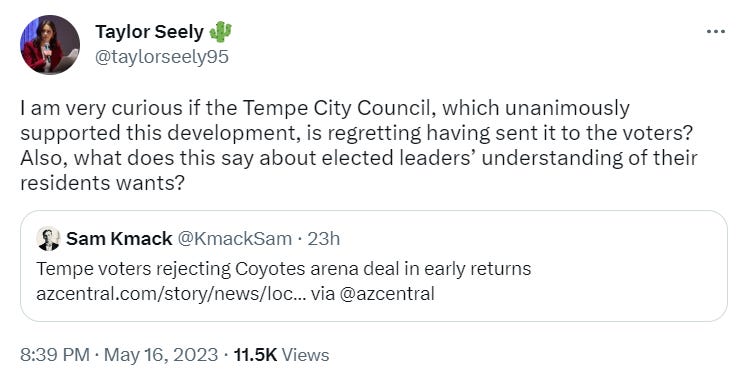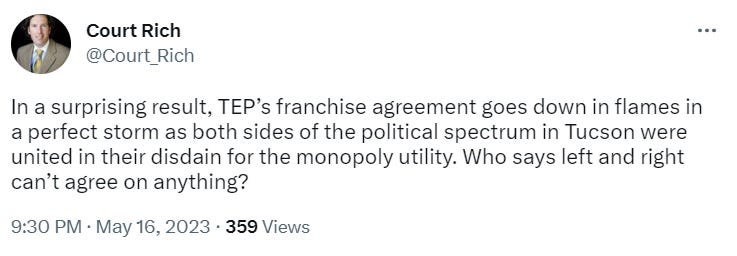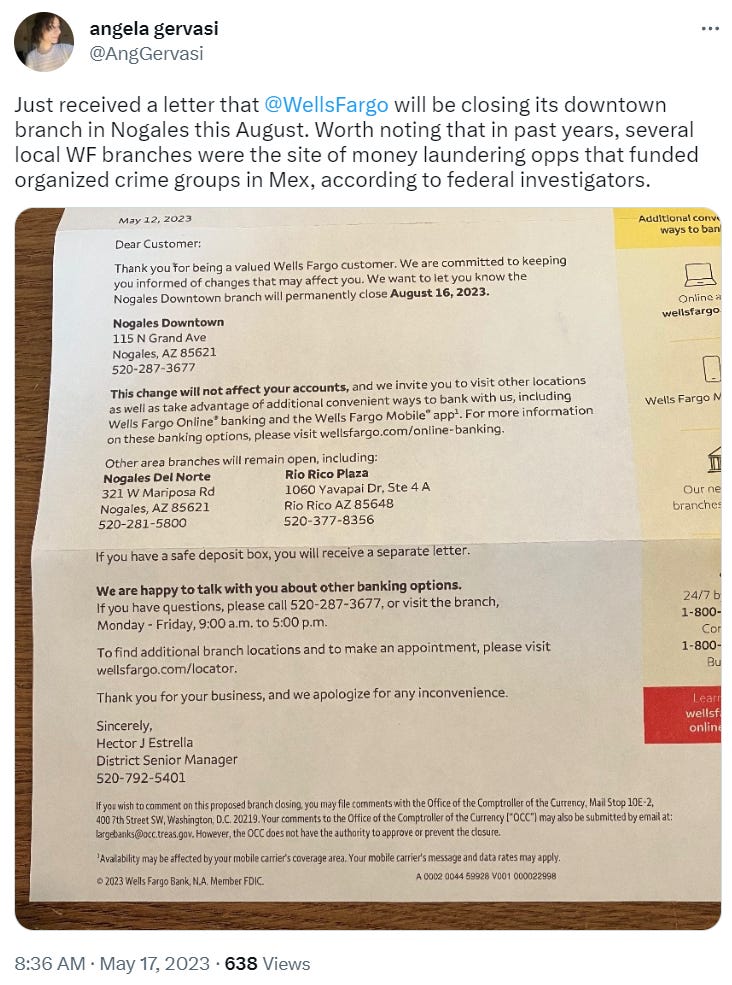The Daily Agenda: City council knows best
A tale of two cities (rejecting propositions) ... $1 billion is a good motivator ... And he should really listen to his wife.
Voters in Tempe and Tucson faced two very different questions when they opened their ballots for Tuesday’s special election. But they rejected both proposals for largely the same reasons.
In Tempe, voters were charged with approving or denying the Arizona Coyotes’ plans to build a new hockey stadium and surrounding entertainment district. Tucson voters had to decide whether to approve Tucson Electric Power’s new contract, which would include a new fee to bury some power lines in historic neighborhoods and help fund the city’s climate action plan.
In both cases, the progressive city councils cooked up the deals with the powerful special interests in private, with minimal public input, then relied on inside-the-bubble political influencers to sell the idea to voters.
And in both cases, the voters simply didn’t like the brand their city council was selling.
Neither of the deals were terrible, exactly. The Coyotes arena deal was structured better than most arena deals, and in a way that would have hopefully avoided the decade of drama that the Coyotes and Glendale suffered through after the West Valley city shelled out huge chunks of its budget to prop up the boondoggle of a stadium there. And TEP’s fee increase deal, while perhaps a harder sell politically, would have ostensibly funded a climate action program in a climate-conscious town.
Each plan had backing from their respective city councils and mayors and various other popular “thought leaders” and “influencers” in business and local Democratic politics. In other words, the proposals had plenty of grasstops support, but no grassroots support. That’s in large part because citizens never had a say in crafting either deal, only a say in whether to approve it or not.
It didn’t help that the organizations that would have benefitted from the propositions are not exactly the kind that inspire generosity.
Coyotes owner Alex Meruelo threatened to sue the opposition campaign, led by the owner of the beloved local bookstore Changing Hands, for calling him a “corrupt billionaire,” which is probably the most effective way to convince people that you are, in fact, a corrupt billionaire.
Tucson Electric Power requested a full rate increase in the middle of the campaign to allow it to charge customers about $14 more per month — and that’s on top of last year’s increase. The power monopoly raked in more than $200 million in profit last year. It’s pretty tough to convince voters you need more money while trying to jack up prices to boost your already huge profits as inflation is soaring.
In both cities, the councils thought they knew best. But in rejecting the proposals to bring the Arizona Coyotes to Tempe and creating a new deal for the power monopoly in Tucson, the voters rejected business as usual at their local city halls.
And voters shot them down it in spite of the huge gobs of money that the deep-pocketed special interests threw into the campaigns.
In Tempe, proponents of the new stadium and entertainment district spent about $1.25 million to convince voters it was a good idea, using local influencers like former mayors Hugh Hallman and Neil Giuliano to peddle it to voters. They were no match for opponents’ $35,000 and guerilla campaign tactics.
In Tucson, proponents of Prop 412, backed by Tucson Electric Power, included Mayor Regina Romero and groups like the Tucson Metro Chamber and the Southern Arizona Leadership Council. They spent at least $200,000 to convince voters to approve its plans. Opponents, including anti-tax Republicans and liberals who wanted the power company to commit more resources to fighting climate change, didn’t report1 any spending against it.
The councilmembers who backed these plans would be wise to remember that in the insular world of city politics, it’s easy to confuse power within the political bubble with influence in the community. And it’s easy to forget that the ones they ultimately have to win over for these deals are the voters, not the special interests.
Money makes anything possible: California, Arizona and Nevada are allegedly close to a deal to conserve water from the Colorado River after more than a year of bitter battles, the Washington Post reports. The plan, which is still tentative and unfinished, would save about 13 percent of the states’ total allotment from the river, and it hinges on a federal promise of about $1 billion in compensation to the states. Meanwhile the City of Scottsdale wants Gov. Katie Hobbs to veto the bill on her desk that would require it to provide water to the Rio Verde Foothills area, 12News’ Brahm Resnik reports. And Republic columnist Joanna Allhands weighs in that the Rio Verde bill is not a great bill, but Hobbs should sign it anyway because it’s better than no bill.
“This is maddening, because of all the water issues Arizona faces, this one should be the easiest to solve,” Allhands writes of the Rio Verde problem. “But it takes a willingness to compromise. And someone who can get personalities out of the way of progress.”
Whose witness is it anyway?: Kari Lake had an objectively disastrous day in court as her “expert witnesses,” who were there to prove that Maricopa County did no signature verification whatsoever in the 2022 election, explained in detail the rigorous process they followed in verifying signatures.
The courts aren’t making this easy for them: The ACLU is asking a federal judge to declare that Phoenix’s block-by-block cleanup of the Zone violates a December court order barring the city from enforcing camping bans for people who do not have access to shelters and from destroying people’s property in the Zone (not the separate court order requiring the city to clean up the Zone), KTAR’s Kevin Stone reports. Phoenix officials deny they destroyed any property in the most recent “sweep” of the area.
Let the vetoes roll: Hobbs vetoed a bill to allow people with concealed weapons permits to bring their guns on college campuses, a bill to ban the state from using a voting machine that had any part manufactured in another country, a bill to expand the Arizona Teachers’ Academy, and many more this week, Capitol scribe Howie Fischer reports. The governor still has a lot of vetoable bills on her desk after lawmakers’ vote-a-thon before their monthlong vacation.
Was the contract made of bamboo?: The Coconino County Board of Supervisors renewed its contract with Rubeck Election Services, the Arizona-based company that prints most of the ballots in Arizona and around the nation, the Daily Sun’s Sierra Ferguson reports. The company, like most companies involved in elections, has been at the center of a few conspiracies.
Maybe run for the council to fix it: Glendale City Councilman Jaime Aldama announced he’ll also challenge Mayor Jerry Weiers for the job in 2024, joining former lawmaker Paul Boyer in the three-way race, the Daily Independent’s Steve Stockmar writes. His pitch to voters is that the council (that he sits on) is too divided, and he says he’s been planning this campaign for about eight years.
Returning to desert: Gilbert wants a $3 million grant from the state to replace grass with xeriscape on the edges of city parks and at city buildings, estimating it could save 16 million gallons of water per year, the Republic’s Maritza Dominguez writes. The town is among the applicants for a grant funded by the $200 million lawmakers set aside last year for water conservation projects.
Still in session: Cities are worried that the lawmakers’ ban on home rental taxes, which Hobbs vetoed, could come back during the never-ending legislative session, and it’s messing with their ability to budget, KJZZ’s Christina Estes reports. The Phoenix City Council is concerned that if lawmakers do get it past the governor on a second try, it would create an $80 million hole in the city budget that they’re still drafting.
We need about four monthly subscribers to pay our rent tax. But we’re having a sale right now, so we actually need five of you!
Take it from him: Discipline is key in schools, Arizona Superintendent of Public Instruction Tom Horne, who violated campaign finance laws, had his SEC license revoked and fled a hit-and-run scene to hide an affair he was having with a woman who worked for him, told KTAR in an interview.
Get em, Jeremy: Disc golf and public records enthusiast Jeremy Thacker filed a complaint with the Attorney General’s Office about the way the City of Phoenix holds executive sessions, the Republic’s Taylor Seely reports. AG Kris Mayes’ office is “actively reviewing” the complaint but hasn’t started a formal investigation.
Democrats like Democrats: Hundreds of former small donors to U.S. Sen Kyrsten Sinema’s campaign (back when she was a Democrat) are jumping ship to support Democratic U.S. Rep. Ruben Gallego instead as he attempts to take her seat and she continues to not say if she’s running for reelection, the Republic’s Ronald Hansen reports. Meanwhile, Gallego sponsored a bill to add fentanyl trafficking to the Patriot Act banking regulations, the Tucson Sentinel’s Paul Ingram reports. The bill would require U.S. banks to track suspected fentanyl-related financial transactions.
The Green Valley News’ Dan Shearer has a must-read profile of John Nejedlo, the local man “who’s been puttering around Green Valley in a golf cart wearing a Donald Trump mask, shackles and an orange prison jumpsuit.”
Nejedlo has been spit at a few times, had passing motorists throw water at him and has been pulled over by the police for driving in a mask. His wife warned him not to get obsessed with the bit, but it does not seem like he took her advice.
“Report” is the operative word here, as the Tucson City Clerk’s Office has no records from Phoenix Republican activist Merissa Hamilton’s Strong Communities Foundation of Arizona, the main group doing “voter education” that looks a lot like opposition campaigning for Prop 412.












I thought I was fairly savvy about this stuff, but I thought you had coined the word "grasstops" and was going to commend you for the invention until I looked it up and saw it was an actual thing. So instead I'll just thank you for teaching me something (as you often do).
Tom Horne, destroying public education one word at a time.